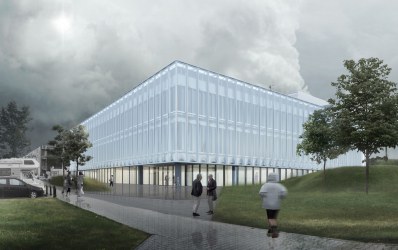The construction of the new Copernican Revolution Lab (CRL) will start in 2019. The investment has just received a grant from the funds of the Mazowieckie Voivodeship and the capital city of Warsaw. The new building of the Copernicus Science Centre complex will be erected in Warsaw’s Powiśle district in 2021.
The Copernican Revolution Lab will be able to accommodate 600 people at a time It will have three above-ground storeys and one underground one with a total usable area of approx. 6000 m². It will be erected in the immediate vicinity of the Copernicus Science Centre, and both venues will be connected by a pedway.
A universal space
The CRL is going to be an open and interdisciplinary space. It will host a number of laboratories fully stocked with equipment needed to conduct biology, chemistry, physics, mechatronics classes, as well as workshops employing new technologies such as 3D printers and VR. It will also feature a large design workshop with tools for designing and constructing various objects. The space will be adapted for testing different formats of classes in a school environment, as well as conditions similar to the working environment of real researchers. One-way mirrors and recording equipment will enable making observations. The new building will also include an office space, a showroom to showcase the current projects being developed in the Lab, as well as a foyer, cloakrooms and a café.
Lab of the future
The Copernican Revolution Lab is a scientific consortium founded by the Copernicus Science Centre (its leader), as well as Moje Bambino and BeCreo Technologies. This is the first interdisciplinary and intersectoral research and development centre in Poland, focusing its research efforts on learning processes and creating products geared toward education.
The Lab will focus its efforts on two main aspects, first being research and development projects. The CRL will serve as a meeting place for experts in fields as diverse as psychology, pedagogy, cultural studies, linguistics, anthropology, sociology, natural sciences and hard sciences. The second aspect entails cooperation with business, which will provide ample opportunities for combining the potential created by the Lab with the unique experience of companies. The CRL is sponsored by Samsung Electronics and Saint Gobain.
We hope that the activities of the Copernican Revolution Lab will result in the development of new knowledge and help building a community involved in research and development of learning processes.

